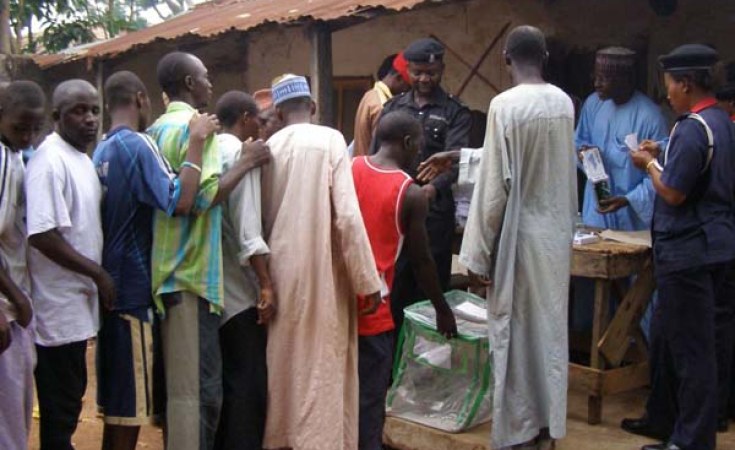Bwari — By 8:30am on a recent Saturday morning, five polling stations sat proudly along the main road through Bwari satellite town outside Nigeria's capital city, Abuja. Traffic flowed as usual; hawkers roamed the streets selling sweets, fruit, and groundnuts. Voters in front of the local government office formed two short queues, one for men and one for women, which grew longer as time passed.
Within two hours, the quiet had vanished. The main street was flooded with youths, piling their bodies closer and closer to the polling stations. Voters at the local government office had abandoned their queue, choosing to cluster around the election table instead. Many of their names were missing from the electoral register, they complained, even though they held official voters' cards.
The fight escalated quickly. Angry youths carried the wooden table into the street. The two police officers guarding the post discreetly packed away the election materials and left. When the voters noticed, hoards of young men chased after the police, dragging back the clear plastic ballot-collection bag to the polling station.
Explained Moses Obaje, an election monitor from the Citizen's Association of Nigeria, "They were making trouble because of the number of voters on the register, compared with the number of voters [on the ground.]."
Of the five polling stations in the Bwari local government area, two turned violent enough to require Nigerian election officials to visit them and try to restore order. Mohammed Abubakar, a commissioner of the Independent National Electoral Commission (INEC), explained that the commission had had difficulty printing the correct register at the last minute because of a computer system failure. "Anyone who holds an INEC voting card is going to vote," he told the voters. More police arrived, this time carrying tear gas. But it was never used.
A Past of Violence
Long before the elections, residents knew there was a possibility of violence: locals in and around Abuja expected it. "Even the last elections, it was not different — we had the same problem," said Abdullahi Magagi, an elder from the community. "If they need peace in Bwari, they must conduct elections properly."
This election was a re-run of last year's race for national Senate and House of Assembly seats. Election tribunals — courts meant to address irregularities in last April's general election — had annulled the previous results.
The candidates whose election was invalidated had belonged to the opposition All Nigerian People's Party (ANPP). Bwari local government is a stronghold of the ANPP, notorious for its often violent opposition to the ruling People's Democratic Party (PDP). Yet factions of the PDP remain in the town, and local PDP supporters are eager to win back the house and senate offices.
Local youths complained of rigging and irregularities in both this month's polling and during last year's presidential election.
Abdullahi Rahaman, a polling agent for the opposition Action Congress (AC) said the election officials were biased against the opposition. "My own agents were disallowed," he complained.
Angry voters at a polling station down the road claimed that they were not allowed a secret vote. "The PDP did not want us to vote," several women shouted. Rumors abounded that money was offered in exchange for votes — in sums of 200 or 300 naira (between U.S.$1.75 and $2.50).
Yet members of the ruling party, too, claimed they had difficulty casting their vote.
Nationwide
Across the country, elections over the past several months have been marred by similar complaints of violence. Last month, one man died in Rivers State local elections in the country's tumultuous Niger Delta region. In Bwari, even children on the streets spoke of the unavoidable election magu-magu — a term referring to ballot stuffing and intimidation.
Nigeria is Africa's largest country by population. With 140 million people spread across a wide and often inaccessible terrain, organizing elections is no small task. Without electronic resources, ballots must be distributed and counted manually. Election tribunals had the additional difficulty of organizing re-run elections on deadlines mandated by the courts — at times without receiving extra funding.
Calls for electoral reform ring from throughout the country. After his own election into power, President Umaru Yar'Adua promised to review electoral procedures. His Presidential Electoral Reform Committee will submit its report later this year. Most, however, believe that the law is not the problem. Elections in 1999, 2003, and 2007 were notoriously flawed and violent; many citizens have come to expect nothing less. Both parties and communities now employ young men to oversee their interests at polling stations on election day.
With each incident in Bwari, cars of angry youths appeared to enter the brawls. Several shouted as they entered polling stations, "You have to fight to vote in this country."
Click here for "Struggling For Peaceful, Fair Elections photoessay"


